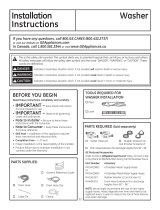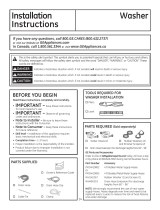Page is loading ...

Installation instructions
instructions 'installation
Printed in U.S.A.
P/N 137153100A (0903)

Table of Contents
Important Safety Instructions ................................................ 2
Installation Requirements .................................................. 2-3
Installed Dimensions ............................................................. 4
Unpacking Instructions .......................................................... 4
Installation Instructions ..................................................... 5-6
Replacement parts ................................................................ 6
Francais ................................................................................ 7
Important Safety Instructions
Foryour safety the information in this manual must be followed to minimize the risk of fire or explosion or to
prevent property damage, personal injury or loss of life. Do not store or use gasoline or other flammable vapors and liquids in
the vicinity of this or any other appliance.
Recognize safety symbols, words and labels
Safety items throughout this manual are labeled with a
WARNING or CAUTION based on the risk type as described:
This symbol alerts you to situations that
may cause serious body harm, death or
property damage.
_This symbol alerts you to situations that may
cause bodily injury or property damage.
Save these instructions
for future reference.
Tools needed for installation:
• 3/8" socket and ratchet
Adjustable pliers
Carpenter's level
Read all of the following instructions before
installing and using this appliance:
Destroy the carton and plastic bags after the dryer is un-
packed. Children might use them for play. Cartons covered
with rugs, bedspreads, or plastic sheets can become airtight
chambers causing suffocation. Placeall materials in a gar-
bage container or make materials inaccessible to children.
The electrical service to the washer must conform with local
codes and ordinances and the latest edition of the National
Electrical Code, ANSI/NFPA70, or in Canada, CSA 22.1
Canadian Electrical Code Part 1.
Toavoid back or other injury, have more than one person
move or lift the washer.
The instructions in this manual and all other literature in-
cluded with this dryer are not meant to cover every possible
condition and situation that may occur. Good safe practice
and caution MUST be applied when installing, operating
and maintaining any appliance.
Installation Requirements
Electrical system requirements
CIRCUIT- Individual, properly polarized and grounded 15
amp. branch circuit fused with 15 amp. time delay fuse or
circuit breaker.
POWERSUPPLY- 2-wire, with ground, 120 volt single phase,
60 Hz, Alternating Current.
I,,L Because of potentially inconsistent voltage capabili-
ties, the use of this washer with power created by gas pow-
ered generators, solar powered generators, wind powered
generators or any other generator other than the local utility
company is not recommended.
OUTLETRECEPTACLE- Properly grounded 3-prong receptacle
to be located so the power supply cord is accessible when
the washer is in an installed position.
GOnLt, under any clrcumstances,-_
Grounding
cut, remove, or bypass the |
type wall grounding prong.
{
receptacle R J
Powercord
with 3-prong
grounded plug
Grounding requirements
- ELECTRICAL SHOCK HAZARD - Improper
connection of the equipment grounding conductor can result
in a risk of electrical shock. Check with a licensed electrician
if you are in doubt asto whether the appliance isproperly
grounded.
,
,
The washer MUSTbe grounded. In the event of malfunction
or breakdown, grounding will reduce the risk of electrical
shock by a path of least resistance for electrical current.
Sinceyour washer is equipped with a power supply cord
having an equipment-grounding conductor and a grounding
plug, the plug MUSTbe plugged into an appropriate,
copper wired receptacle that isproperly installed and
grounded in accordance with all local codes and ordinances
or in the absence of local codes, with the National Electrical
Codes, ANSI/NFPA70 (latest edition). If in doubt, call a
licensed electrician. DO NOT cut off or alter the grounding
prong on the power supply cord. In situations where a
two-slot receptacle ispresent, it isthe owner's responsibility
to have a licensed electrician replace it with a properly
grounded three prong grounding type receptacle.
GFI(Ground Fault Interrupter) receptacle is not re-
quired.

Water supply requirements Installation in a Recess or Closet
Hot and cold water faucets MUST be installed within 42
inches (107 cm) of your washer's water inlet. The faucets
MUST be 3/4 inch (1.9 cm) with threading for laundry hose
connection. Water pressure MUST be between 30 and 120
psi. Pressuredifference between hot and cold cannot be more
than 10 psi. Your water department can advise you of your
water pressure.
Drain system requirements
Drain capable of eliminating 17 gals (64.3 L) per minute.
A standpipe diameter of 1-1/4 in. (3.18 cm) minimum.
The standpipe height above the floor should be:
Minimum height: 33 in. (84 cm)
Maximum height: 96 in. (244 cm)
1
96"
(244cm) ]
max.
33"
(84cm)
min.
1
I,
For installations requiring a longer drain hose, have a
qualified technician install a longer drain hose (according to
your model number) available from an authorized parts dis-
tributor. For drain systems in the floor, install a syphon break
kit available from your local hardware store.
Clearance requirements
DO NOT INSTALL YOUR WASHER:
1. In an area exposed to dripping water or outside weather
conditions. The ambient temperature should never be be-
low 60 ° F(15.6 ° C) to maximize detergent effectiveness
2. In an area (garage or garage-type building) where gaso-
line or other flammables (including automobiles) are kept
or stored.
3. On carpet. Floor MUST be solid with a maximum slope
of 1 inch (2.54 cm). To minimize vibration or movement,
reinforcement of the floor may be necessary.
If washer and dryer are installed in the same closet, door
ventilation isrequired: A minimum of 120 square inches
(774.2 cm2) of opening, equally divided at the top and
bottom of the door, isrequired. Louvered openings should
be located 3 inches (7.6 cm) from bottom and top of door.
Air openings are required to be unobstructed when a door
is installed. A Iouvered door with equivalent air openings for
the full length of the door is acceptable.
(7.6cm)
3"
(7_6cm)
closet door
---_--
60 sq. in.
(387.1 cm=}
lll_--ll
60 sq" in.
(387.1cm_)
MINIMUM INSTALLATIONCLEARANCES- Inches (cm)
SIDES REAR TOP FRONT
Alcove 0" (0 cm) 0" (0 cm) 16" (40.5 cm) n/a
Under-
n/a n/a n/a n/a
Counter
Closet 0" (0 cm) 0" (0 cm) 16" (40.5 cm) 1" (2.5 cm)
0" 0"
(o cm) (o cm)
Ii; IllI
II
-.._,l_-- ----_llb.,,---
i,
; o o
(2.5 cm)
i I
16 II
(40.5 cm)
O"
(o cm)

Installed Washer Dimensions
water supply connection on
rear of washer, inlet hose length
approximately 43" (109 cm)
drain hose retention clamp
on rear of washer, loose
hose length beyond clamp
approximately 54" (137 cm)
power cord length on rear of
washer approximately 59" (150 cm)
( 00
(61 cm)
C',,
27" (68.6 cm)
l
36"
(91.5 cm)
l 51 " (129.5 cm)
to clear open lid "":::::::-
43 5/8"
(111 cm)
m m
m
m m
m m
27" (68.6 cm)
Unpacking Instructions
To prevent vibration, possible machine dam-
age and maximize performance, the following steps must be
completed.
1. If foam tub block has been
removed, reinsert it now and
retape the lid securely.
,
,,
Using a rug, blanket or piece of cardboard to protect the
floor, carefully laythe washer on its left side.
PLASTIC
SPACER WIRE CLIP
SHIPPING
BOLT
PLASTIC
CLIP
3. Using a ratchet with 3/8" socket, remove the mechanism
shipping bolt and plastic spacer block from the center of
the base.
If the washer isto be transported at a later date,
the tub blocking pad, shipping bolt, and plastic spacer block
should be retained.
4. Carefully return the washer to an upright position.
5. Remove the tape holding the lid shut and open the lid.
6. Remove the foam tub block.
7. Remove the inlet hoses and other tub contents.
8. From the back of the washer, remove the wire shipping
clip securing the drain hose.
9. DO NOT remove the PLASTICCLAMP which secures the
drain hose to the right side of the washer backsheet. It
helps form a standpipe to prevent water siphoning.
l O.Carefully move the washer to within 4 feet of the final
location for the start of the installation.

Installation Instructions
Leveling your washer
Excessivenoise and vibration can be prevented by properly
leveling the washer.
1. With the washer within 4 feet (1 m) of its final location,
place a level on top of the washer.
2. Use adjustable pliers to adjust the leveling legs so the
washer is level front-to-rear and side-to-side, and stable
corner-to-corner.
3. Pressdown on alternate corners and sides and feel for the
slightest movement. Adjust the appropriate leg(s) so the
washer sits solidly on the floor on ALL four legs. Keep the
leveling leg extension at a minimum for best performance
of the washer.
Connecting inlet water
1. Runsome water from the hot and cold faucets to flush the
water linesand remove particles that might clog the water
valve screensand to determine which faucet is hot and
which iscold supply.
2. Remove the inlet hoses and rubber washers from the
plastic bag located in the drum of the washer and install
the rubber washers in each end of the inlet hoses.
RUBBERWASHERS ....\,_ ,,
MUST BEPRESENT
\
USE ONLY
NEW HOSES
a b
@"
3. Connect the HOT inlet hose to the HOT inlet connection
on the washer and the COLD inlet hose to the COLD
inlet connection on the washer. Tighten by hand until
snug. Then tighten each supply connection another 2/3
turn with pliers. Do not crossthread or over-tighten these
connections.
4. Connect the HOTinlet hose to the HOTwater supply and
the COLD inlet hose to the COLO water supply. Tighten
by hand until snug. Then tighten each supply connection
another 2/3 turn with pliers.
5. Turn on the water and check for leaks.
d
/\
• /
-",xx xC-

Connecting drain and electrical
1. Form a "U" shape on the end of the drain hose with the hose
pointed toward the drain• Placethe formed end in a laundry
tub or a standpipe and secure with a cable tie provided in the
enclosure package•
2. Placethe hook end of the drain hose in the drain opening•
Secure the drain hose with the cable tie (provided in the
enclosure package) to the standpipe, inlet hose, laundry tub,
etc. so the hose does not pull out from the force of the water•
[_®_ The standpipe inside diameter must be 1-1/4" (3.2
cm) minimum• There must be an air gap around the drain hose
in the standpipe• A snug hose fit can cause a siphoning action•
,
Check to ensure the power is off at circuit
breaker/fuse box before plugging the power cord into outlet•
Plug the power cord into a grounded outlet•
P_er CordWith
3.prong grounded plug
CABLE TIE
I
t
4. Turn on the power at circuit breaker/fuse box.
5. Carefully slide the washer to its final position• Recheckfor level
and rock corners for stability.
6. Readthe Use & Care Guide provided with the washer• It
contains valuable and helpful information that will save you
time and money•
7. Run the washer through a complete cycle, checking for water
leaks and proper operation•
8. If you have any questions during initial operation, please review
the "Service Prevention Checklist" in your Use & Care Guide
before calling for service•
9. Placethese instructions in a location near the washer for future
reference•
/_; _ A w r ng diagram and technical data sheet are
located inside the washer console•
Replacement parts:
If replacements parts are needed for your washer, contact the _ - ELECTRICAL SHOCK HAZARD - Label all
source where you purchased your washer• wires prior to disconnection when servicing controls• Wiring
errors can cause improper and dangerous operation• Verify
proper operation after servicing•
/

